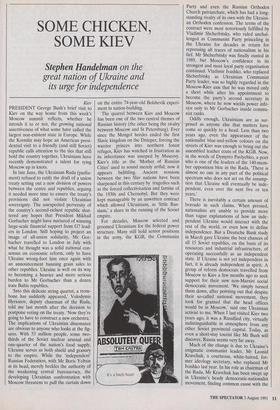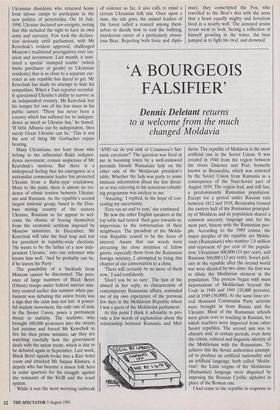SOME CHICKEN, SOME KIEV
Stephen Handelman on the great nation of Ukraine and its urge for independence
Kiev PRESIDENT George Bush's brief visit to Kiev on the way home from this week's Moscow summit reflects, whether he intends it to or not, the growing national assertiveness of what some have called the largest non-existent state in Europe. While the Kremlin may hope an American presi- dential visit to a friendly (and still Soviet) republic calls attention to the ties that still hold the country together, Ukrainians have recently demonstrated a talent for tying Moscow up in knots.
In late June, the Ukrainian Rada (parlia- ment) refused to ratify the draft of a union treaty setting out a new division of powers between the centre and republics, arguing it needed more time to ensure the treaty's provisions did not violate Ukrainian sovereignty. The unexpected perversity of the country's second-richest republic shat- tered any hopes that President Mikhail Gorbachev might have nurtured of winning large-scale financial support from G7 lead- ers in London. Still hoping to project an image of all-union solidarity, Mr Gor- bachev travelled to London in July with what he thought was a solid national con- sensus on economic reform, only to have Ukraine wrong-foot him once again with an announcement banning grain sales to other republics. Ukraine is well on its way to becoming a heavier and more serious burden to Mr Gorbachev than a dozen irate Baltic republics.
`Into this delicate string quartet, a trom- bone has suddenly appeared,' Volodymir Hyrionov, deputy chairman of the Rada, told me last month after the decision to postpone voting on the treaty. 'Now they're going to have to construct a new orchestra.' The implications of Ukrainian dissonance are obvious to anyone who looks at the fig- ures. With 53 million people, some two- thirds of the Soviet nuclear arsenal and one-quarter of the nation's food supply, Ukraine serves as both shield and granary to the empire. While the 'independent' Russian Federation, with Mr Boris Yeltsin at its head, merely heckles the authority of the weakening central bureaucracy, the developing Ukrainian confrontation with Moscow threatens to pull the curtain down on the entire 74-year-old Bolshevik experi- ment in nation-building.
The quarrel between Kiev and Moscow has been one of the two central themes of Russian history (the other being the rivalry between Moscow and St Petersburg). Ever since the Mongol hordes ended the first Slavic kingdom on the Dnieper, forcing the warrior princes into northern forest refuges, Kiev has watched in frustration as its inheritance was usurped by Muscovy. Kiev's title as the 'Mother of Russian Cities' used to sound merely artful; now it appears belittling. Ancient tensions between the two Slav nations have been sharpened in this century by tragedies such as the forced collectivisation and famine of the 1930s and Chernobyl. But they were kept manageable by an unwritten contract which allowed Ukrainians, as 'little Rus- sians,' a share in the running of the Soviet empire. For decades, Moscow selected and groomed Ukrainians for the federal power structure. Many still hold senior positions in the army, the KGB, the Communist Party and even the Russian Orthodox Church patriarchate, which has had a long- standing rivalry of its own with the Ukraini- an Orthodox confession. The terms of the contract were most notoriously fulfilled by Vladimir Shcherbitsky, who ruled unchal- lenged as Communist Party princeling in the Ukraine for decades in return for repressing all traces of nationalism in his fief. Mr Shcherbitsky was finally ousted in 1989, but Moscow's confidence in its strongest and most loyal party organisation continued. Vladimir Ivashko, who replaced Shcherbitsky as Ukrainian Communist Party leader, was so highly regarded in the Moscow-Kiev axis that he was moved only a short while after his appointment to become the party's second secretary in Moscow, where he now wields power infe- rior only to Mr Gorbachev inside commu- nist ranks.
Oddly enough, Ukrainians are as sur- prised as anyone else that matters have come so quickly to a head. Less than two years ago, even the appearance of the nationalist blue-and-yellow colours on the streets of Kiev was enough to bring out the assembled leather coats of the KGB. Now, in the words of Dymytro Pavlychko, a poet who is one of the leaders of the 140-mem- ber opposition bloc in the Rada, 'There is almost no one in any part of the political spectrum who does not act on the assump- tion that Ukraine will eventually be inde- pendent, even over the next five or ten years.'
There is inevitably a certain amount of bravado in such claims. When pressed, nationalists are unable to provide more than vague explanations of how an inde- pendent Ukraine would interact with the rest of the world, or even how to define independence. But a Deutsche Bank study in March gave Ukraine the best chances of all 15 Soviet republics, on the basis of its resources and industrial infrastructure, of operating successfully as an independent state. If Ukraine is not yet independent in fact, it is already independent in spirit. A group of reform democrats travelled from Moscow to Kiev a few months ago to seek support for their new non-Marxist social democratic movement. 'We simply turned them down, after pointing out that despite their so-called national movement, they took for granted that the head offices would be in Moscow,' said one Ukrainian activist to me. When I last visited Kiev two years ago, it was a Russified city, virtually indistinguishable in atmosphere from any other Soviet provincial capital. Today, as even a short-stay tourist like Mr Bush will discover, Russia seems very far away. Much of the change is due to Ukraine's enigmatic communist leader, Mr Leonid Kravchuk, a courteous, white-haired, for- mer ideology secretary, who replaced Mr Ivashko last year. In his role as chairman of the Rada, Mr Kravchuk has been swept up in Ukraine's heady democratic-nationalist movement, finding common cause with the Ukrainian dissidents who returned home from labour camps to participate in the new politics of perestroika. On 16 July, 1990, Ukraine declared sov-ereignty, noting that this included the right to have its own army and currency. Few took the declara- tion seriously until parliament, with Mr Kravchuk's evident approval, challenged Moscow's traditional prerogatives over tax- ation and investment. Last month, it insti- tuted a special 'stamped rouble' (which limits purchases of goods) to Ukrainian residents) that is as close to a separate cur- rency as any republic has dared to get. Mr Kravchuk has made no attempt to hide his sympathies. When a Tass reporter scornful- ly questioned Ukraine's ability to survive as an independent country, Mr Kravchuk lost his temper for one of the few times in his public career. 'There has never been a country which has suffered for its indepen- dence as much as Ukraine has,' he fumed. `If little Albania can be independent, then surely Great Ukraine can be.' This is not the sort of thing Mr Gorbachev enjoys hearing.
Many Ukrainians, not least those who belong to the influential Rukh indepen- dence movement, remain suspicious of Mr Kravchuk's motives. But there is a widespread feeling that his emergence as a nationalist communist leader has protected Ukraine from a Baltic-type crackdown. More to the point, there is almost no evi- dence of ethnic tension between Ukraini- ans and Russians. As the republic's second largest national group, based in the Don- bass mining country of the eastern Ukraine, Russians so far appear to wel- come the chance of freeing themselves from the economic serfdom imposed by Moscow ministries. In December, Mr Kravchuk will take the final leap and run for president in republic-wide elections. `He wants to be the father of a new inde- pendent Ukraine,' says one reformer who knows him well. 'And he probably can be, if he leaves the Party.'
The possibility of a backlash from Moscow cannot be discounted. The pres- ence of large numbers of Black Beret (Omon) troops under federal interior min- istry control earlier this summer when par- liament was debating the union treaty was a sign that the calm may not last. A power- ful student movement, the only one of note in the Soviet Union, poses a permanent threat to stability. The students, who brought 100,000 protesters into the streets last autumn and forced Mr Kravchuk to fire his then prime minister, say they are watching carefully how the government deals with the union treaty, which is due to be debated again in September. Last week, Black Beret squads broke into a Kiev hotel room and attacked Mr Stepan Khmara, a deputy who has become a minor folk hero in some quarters for his struggle against the remnants of the KGB and the court system.
While it was the most worrying outbreak of violence so far, it also calls to mind a certain Ukrainian folk tale. Once upon a time, the tale goes, the animal leaders of the forest called a council among them- selves to decide how to end the bullying, murderous career of a particularly obnox- ious Bear. Rejecting both force and diplo- macy, they conscripted the Fox, who travelled to the Bear's den with the news that a beast equally mighty and ferocious lived in a nearby well. The annoyed ursine tyrant went to look. Seeing a reflection of himself growling in the water, the bear jumped in to fight his rival, and drowned.



















































 Previous page
Previous page